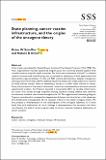| dc.contributor.author | Scheffler, Robin W | |
| dc.contributor.author | Aviles, Natalie B | |
| dc.date.accessioned | 2022-12-15T19:15:31Z | |
| dc.date.available | 2022-12-15T19:15:31Z | |
| dc.date.issued | 2022 | |
| dc.identifier.uri | https://hdl.handle.net/1721.1/146895 | |
| dc.description.abstract | <jats:p> In this article, we analyze the National Cancer Institute’s Virus Cancer Programs (1964–1978). The NCI’s organizational mandate established program goals that iteratively braided together both scientific research and public health outcomes. The distinctive environment of the NCI as a federal research institute made scientific programs accountable to evaluations of both experimental and administrative appropriateness. To this end, NCI scientist-administrators adopted management techniques drawn from the Cold War defense industry to direct open-ended exploratory research on virally induced cancers, aimed at developing a vaccine as a public health solution to cancer. Facing the limitations of the state of viral cancer research as simultaneously an administrative and experimental problem, the Programs launched a monumental effort to develop infrastructure for cancer virus studies through long-term planning initiatives utilizing defense-style networks of contracted academic laboratories throughout the US. The organizational mandate guiding the Programs contributed to conceptual and experimental changes that directly led to the subversion of its fundamental presupposition of viral causation in favor of the cellular oncogene theory. We thus propose a reinterpretation of the historiography of the oncogene hypothesis as a radical break from viral explanations of cancer etiology, a reinterpretation that re-centers the direct contributions this federal vaccine program made to current molecular biological explanations of cancer causation. </jats:p> | en_US |
| dc.language.iso | en | |
| dc.publisher | SAGE Publications | en_US |
| dc.relation.isversionof | 10.1177/03063127211070304 | en_US |
| dc.rights | Creative Commons Attribution-Noncommercial-Share Alike | en_US |
| dc.rights.uri | http://creativecommons.org/licenses/by-nc-sa/4.0/ | en_US |
| dc.source | Prof. Scheffler via Ece Turnator | en_US |
| dc.title | State planning, cancer vaccine infrastructure, and the origins of the oncogene theory | en_US |
| dc.type | Article | en_US |
| dc.identifier.citation | Scheffler, Robin W and Aviles, Natalie B. 2022. "State planning, cancer vaccine infrastructure, and the origins of the oncogene theory." Social Studies of Science, 52 (2). | |
| dc.contributor.department | Massachusetts Institute of Technology. Program in Science, Technology and Society | en_US |
| dc.relation.journal | Social Studies of Science | en_US |
| dc.eprint.version | Author's final manuscript | en_US |
| dc.type.uri | http://purl.org/eprint/type/JournalArticle | en_US |
| eprint.status | http://purl.org/eprint/status/PeerReviewed | en_US |
| dc.date.updated | 2022-12-15T19:08:51Z | |
| dspace.orderedauthors | Scheffler, RW; Aviles, NB | en_US |
| dspace.date.submission | 2022-12-15T19:08:52Z | |
| mit.journal.volume | 52 | en_US |
| mit.journal.issue | 2 | en_US |
| mit.license | OPEN_ACCESS_POLICY | |
| mit.metadata.status | Authority Work and Publication Information Needed | en_US |
